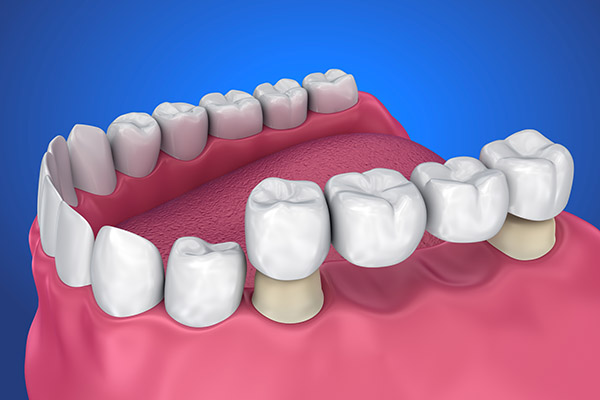Tooth Replacement Options: Implants, Bridges, Dentures
- Home
- Tooth Replacement Options: Implants, Bridges, Dentures

Millions of adults have lost one or more of their teeth due to oral diseases or injury. Missing teeth can make chewing difficult, cause problems speaking, and impact a person’s sense of self-esteem. That’s why seeing a dentist about tooth replacements, which may include dental implants, bridges, or dentures, can be an important part of maintaining your dental health.
For people who have lost all or most of their teeth, dentures, or false teeth, may be the most AFFORDABLE tooth replacement option. There are three types of dentures:
Dentures can help you maintain your facial shape and your self-esteem. It may take some time before you’re able to chew and speak normally again, but these skills will improve with practice.
A typical bridge consists of two crowns (one on each side of the gap created by missing tooth/teeth) and a false tooth/teeth (that fill in the gap and is attached to the crowns). These two crowned ‘anchoring teeth’ are called abutment teeth. These supporting teeth can be natural teeth or dental implants.
Dental bridges could be made from various materials, including gold, alloys, and porcelain. They can help maintain the shape of your face and the integrity of your bite, and allow you to chew, speak, and smile with more ease and confidence.
Dental implants are the only tooth replacement option that preserves bone and does not compromise the health of adjacent teeth – and they can potentially last a lifetime. Dental implants are often a preferred tooth replacement option because they do not affect the adjacent teeth like a bridge does. Dental implants also look and feel like natural teeth, and are more secure than removable dentures.
But not everyone is a candidate for dental implants. To receive dental implants, you must be in good overall health, your jawbone must be able to adequately hold the implants in place, and your gum tissue should be healthy and free of disease. So, in some cases, a bridge or dentures without dental implants may be a better choice.
If you are missing teeth, talk with your dentist about whether dental implants, bridges, or dentures may be options for you.